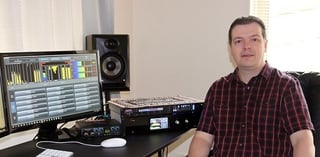Meet Warrick Marais: Audio Processing Expert | Telos Alliance
By The Telos Alliance Team on Jun 21, 2017 11:45:00 AM
 Meet Warrick Marais: Audio Processing Expert
Meet Warrick Marais: Audio Processing Expert
Warrick Marais is the new in-house Broadcast Engineer specializing in audio processing with our friends at New Zealand-based AVC Group, a major Telos Alliance dealer across the South Pacific, India, the Middle East, and beyond. Warrick’s background runs the gamut of audio, from audio production in the pro audio arena and film, to audio processing for radio and television, to live performance audio. So when AVC was looking for someone with a high level of expertise in the realm of audio, the range of experience Warrick brings to the table–not to mention his familiarity with AVC from past work–made him the ideal choice.
We sat down with Warrick recently for some insight into his wide-ranging career, and his thoughts on the different aspects of working in the audio industry.
How did you get involved in the audio industry, and audio processing specifically?
I began my career in radio with the South Africa Broadcasting Corporation as a Technician, and then later became involved with a radio station in Port Elizabeth, South Africa, where I assisted both on the technical and production arenas, and thus began my interest in processing. I’ve been an audio guy all my life… I was the guy in the bedroom recording his guitar at 16, and that’s how I got into it. I did a lot of work doing live sound in high school and progressed from there. I’ve always had a love for the audio creation process and generating great sound, and that’s how I got involved in the processing side.
Tell us a little about the difference between the pro audio world and the broadcast audio processing world.
The key difference is that for music production you’re basically trying to create the sound of an instrument. You are generating a sonic signature for a particular piece or particular instrument. You’re not thinking globally in that sense, you’re thinking, “Well I need this particular instrument to match that particular instrument. How do I create that sound?” This is different from audio processing in the broadcast world, where you’re typically thinking in mastering terms and you’re working with the finished product—music that’s already pre-mixed by the mixing engineer. You want to basically create a sound for the overall concept of the piece. The ultimate goal is to create a sonic signature for the overall sound of the station, which is more like mastering and less like mixing.
What are some of the challenges that come along with moving from one realm to the other?
The challenge in broadcast processing is that a Program Director will typically have a very specific sound in mind for his station, and a key aspect to consider is whether that sound is appropriate. One particular PD I worked with liked the sound of a station in another market and wanted his station to sound like it. We had to have a discussion as to whether that sound would be ideal for his market.
It’s quite difficult to discuss stuff like that because, how do you describe what a sound is? Is it blue? Is it green? It’s an interesting interactive talk, especially when you’re talking to people who are not processing literate and may not fully grasp the terminology and all the considerations.
Even across the different mediums within the broadcast world there are significant differences in how audio is processed. Give us your thoughts on Radio processing v. TV processing.
Radio processing and TV processing are two completely different beasts. You’ve got to almost switch your brain when you’re doing the two of them. Working as a TV engineer it took me a while to get my head around mixing to a strict specification, because the way you have to mix is very different. With TV it's all about dialog intelligibility and with radio it's all about the overall sonic signature of the station.
With TV processing you have to stay within specific, standardized levels, but you don’t necessarily want to impact the sonic signature of the sound. Your aim is not to create a signature but rather improve on what's there. TV engineers spend hours and hours mixing the shows and you don’t really want to touch that.
"Radio processing and TV processing are two completely different beasts. You’ve got to almost switch your brain when you’re doing the two of them ... As a TV engineer it took me a while to get my head around mixing to a different specification, because the way you mix is very different."
—Warrick Marais, AVC Group
What’s your review on Omnia and Linear Acoustic products?
With Omnia, the 7 and 9 are very clean. The 11 has a different sonic texture to it. It sounds more "analog"… It’s rounder, it’s warmer. The 9 and the 7 I’d use on classical music because it’s so clean, while the 11 I’d used on a rock station.
Then of course we have the new baby, the Omnia VOLT. The sound of that blew me away straight out of the box without having to do any preset editing. It sounds awesome. It’s got a little bit of character from both sides… It has a lot of the 11 sound, but it seems to have also taken a lesson from the 7 and the 9 from the cleanness point of view. It’s clean but it’s still warmer at the same time. It’s the best of both worlds.
On the TV side, with Linear Acoustic, I just spent some time in Fiji setting up all the Linear Acoustic boxes there for their television processing. I think that’s a great product for surround sound upmixing and Dolby Digital integration. It’s easy to install and works out of the box and includes the great clean sound of the Omnia.9 algorithms.
What’s your feeling about technology like declipper?
What’s happened in the industry is that mastering engineers like to crunch things too much to try and beat the loudness wars, which involves clipping the sound. After going through radio processing you're effectively double-processing at that point, and it just ends up being ugly. So the declipper functionality is amazing. It attempts to undo the clipping by interpolating what was removed by the clipping. It’s a great tool, especially for the music that’s coming out now.
Do you think what radio stations are wanting with their sound has changed in the last 10 years?
To be honest I’d have to say no. I can’t speak for the U.S. but in Europe, South Africa, and Australia, they’ve kind of been stuck on the same sound for the last ten years. We’re trying to break that barrier now, to create a cleaner, more dynamic sound with the current processors on the market, but still maintaining the perceived loudness.
I’ve been involved with stations of a variety of formats, and it’s often hard to break old habits. Some broadcasters want their station’s sound to stay as it’s been, but at times adjustments are necessary to improve the sound based on the style of music a station features. But it can be a struggle at times to convince them to try something different.
You were trained as a classical pianist. What kind of music do you listen to you when you’re relaxing? Do you listen to a lot of classical music?
Funny enough that would be no, I don’t. I like listening to acoustic guitar work, and I listen to a lot of jazz like Oscar Peterson and other piano greats. I like a lot of individual instrument styles of music like acoustic guitar or piano music. That’s my relax music.
Any special challenges with pianos and acoustic instruments when it comes to processing or mixing?
There’s a lot of harmonic information in those particular instruments, especially piano, because you’ve got the whole range of frequencies, from bass all the way up to the top, and even stuff you can’t hear with the human ear is there. It all affects the final product.
With processing, if you push piano too hard it starts breaking up and becomes brittle, so you have to watch. Especially classical music with a lot of piano behind it, you have to be careful you don’t push the dials too far.
Any instrument in its own right has frequencies that it’s more prevalent in, and you have to watch those frequencies. With piano the problem is you have the entire range to deal with.
Any personal details of note?
I’ve moved around the world a lot and enjoy the challenge of meeting new people. I grew up in South Africa then moved to New Zealand, worked here for three years, and then won the green card lottery and moved to the states. I was there for 10 years working in film, radio, and television, mostly in an audio post-production environment and working with surround sound for television, which is another world unto itself.
How have the moves across so many different continents, countries, and cultures gone? Has it been an adjustment?
I’d say so, yes. Coming to America was the most challenging. It’s a very different culture with how people interact with each other. I lived in New York for a year-and-a-half and it’s very much about business, whereas South Africa and New Zealand are much more laid back. It’s kind of an ‘I’ll get to it tomorrow’ attitude. In New York you can't do that. It’s got to happen now. When I moved to L.A., it was a very different entity all to itself, nothing like New York at all; it seemed like a different country.
What’s it like working for AVC?
It’s a crazy roller coaster ride, no two days are the same. I previously worked for the company that eventually became AVC, and because of that previous connection and my last ten years of experience, I was asked to come back and add my expertise to the team.
When you’re not working with audio processing you’re…?
I listen to a lot of music and I’m really into movies. Another passion of mine is sound design... Even though it’s still audio it’s a different discipline altogether.
Thanks Warrick! Congrats on the new position and we look forward to working with you and the crazy crew at AVC!
Further Reading
For more about our dealers and partners, check out these stories:
Partner Highlight: Keeping Time with Voceware
Telos Alliance Welcomes Yellowtec as Latest Livewire Partner
Telos Alliance has led the audio industry’s innovation in Broadcast Audio, Digital Mixing & Mastering, Audio Processors & Compression, Broadcast Mixing Consoles, Audio Interfaces, AoIP & VoIP for over three decades. The Telos Alliance family of products include Telos® Systems, Omnia® Audio, Axia® Audio, Linear Acoustic®, 25-Seven® Systems, Minnetonka™ Audio and Jünger Audio. Covering all ranges of Audio Applications for Radio & Television from Telos Infinity IP Intercom Systems, Jünger Audio AIXpressor Audio Processor, Omnia 11 Radio Processors, Axia Networked Quasar Broadcast Mixing Consoles and Linear Acoustic AMS Audio Quality Loudness Monitoring and 25-Seven TVC-15 Watermark Analyzer & Monitor. Telos Alliance offers audio solutions for any and every Radio, Television, Live Events, Podcast & Live Streaming Studio With Telos Alliance “Broadcast Without Limits.”
Recent Posts
Subscribe
If you love broadcast audio, you'll love Telos Alliance's newsletter. Get it delivered to your inbox by subscribing below!